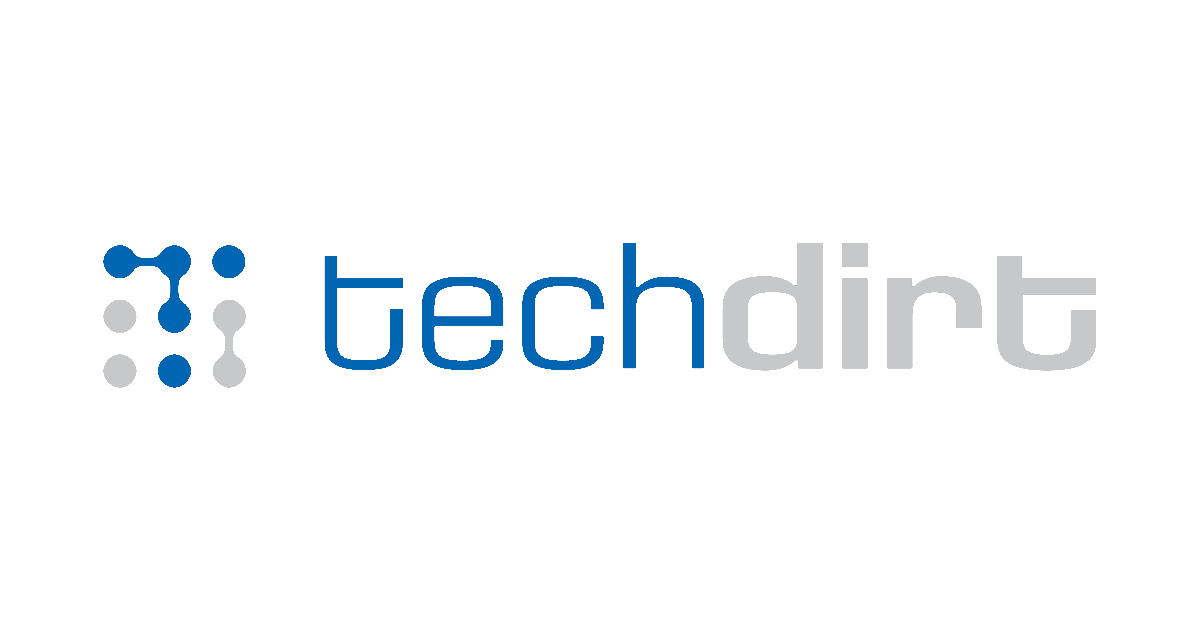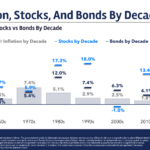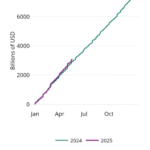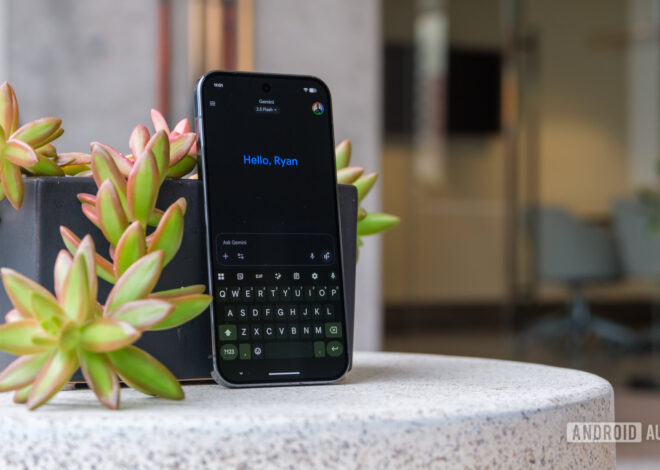
Don’t Worry About That Pesky Law Congress Passed, And SCOTUS Upheld, Banning TikTok; Trump And Bondi Have Spoken
from the all-hail-the-king-(and-his-deputy) dept
I wasn’t wrong when I wrote that Apple, Google, Akamai, and others faced tremendous liability risk if they continued to provide any of their hosting services to TikTok. Of course, not because it should be illegal – the operative law is incredibly unconstitutional, despite the trite reasoning by the Supreme Court finding it otherwise. But because, as long as it remains an enforceable law, it includes terms that make providing these services to TikTok punishable by exorbitant sanctions that can potentially run into the billions of dollars.
And yet, here all these companies are, nevertheless providing these services, as if there were no law telling them they can’t. So what happened?
Apparently, Trump and US Attorney General Pam Bondi are what happened.
Some of this we knew already. The TikTok ban was a ticking time bomb for whomever won the 2024 Presidential Election because from almost the very first moment their term began the law’s teeth would be fully sharpened, effectively banning TikTok in America and penalizing anyone who helped it provide service anyway. As a now fully-ripe law the President would have no choice but to enforce it, consistent with his constitutional obligation to “take Care that the Laws be faithfully executed,” no matter how crummy, stupid, or illiberal those laws may be. Sometimes some presidents have refused to enforce laws that they consider unconstitutional and thus inconsistent with their oath to uphold the Constitution, but taking that position looks extremely dubious when the law in question has already been found constitutional by the Supreme Court (no matter how speciously). And in no circumstance does the President have the constitutional authority to change any laws duly passed by Congress, which has exclusive legislative authority in our constitutional system—none belongs to the President. The President can neither pass legislation nor modify legislation that has been passed. Thus the President’s discretion with respect to this law is limited, except possibly in two potential ways, neither of which allow what has happened here.
One way is by the terms of the law itself, which allowed the President to provide a short reprieve to TikTok before it got fully banned, but only if certain conditions were met, namely that negotiations for its imminent sale were significantly underway. Trump has so far now issued several executive orders purporting to give TikTok and its third party enablers a stay of execution, yet never permissibly because those statutory conditions that would have entitled him to provide them were never met. These “extensions” that he granted were therefore an abuse of an imaginary power Trump does not actually have, either by the terms of the law itself or any other constitutional authority. They are thus a legal nullity no one can safely rely on.
Then there is the other way, which is through the exercise of prosecutorial discretion. The Constitution itself does not actually authorize the President to pick and choose which laws will get enforced—in fact, per its plain language, his job is to enforce all of them—but the realities of law enforcement mean that these sorts of choices effectively happen all the time, at least to some extent. Prosecutors are always deciding whom to charge and how because it can’t realistically be “everyone for everything” nor would we want it to be. Still, there have been other rules and norms that have tried to ensure that federal prosecutions would not be arbitrary and unjust, including the long-recognized separation between the President and the Department of Justice, which helped to ensure that prosecutions would be consistent with the rule of law and not vulnerable to the President’s political whims.
Yet here we are, now learning that, at Trump’s behest, AG Bondi has exercised this supposed prosecutorial discretion by sending letters to these third party companies promising not to enforce the law against them. For example, here is some language from one letter to Apple, with the promise phrased as a(n extremely ludicrous if not also illiterate) determination that there is no liability that could be prosecuted:
Based on the Attorney General’s review of the facts and circumstances, Apple Inc. has committed no violation of the Act and Apple Inc. has incurred no liability under the Act during the Covered Period or the Extended Covered Period. Apple Inc. may continue to provide services to TikTok as contemplated by these Executive Orders without violating the Act, and without incurring any legal liability.
The bigger problem, however, is that the letters do more than tell the companies that Trump will not prosecute them, probably because that promise alone would not be enough to ameliorate the legal risk the companies face by providing TikTok services in violation of the statutory language telling them not to. After all, at five years the statute of limitations—or the time period after which a violation of the law could still be prosecuted—extends beyond a single presidency term. If there’s a new president, with a new Attorney General, violations happening now could still be prosecuted then.
Perhaps realizing that this promise not to prosecute would probably not be enough to induce the platforms to continue to provide their services, Bondi, on behalf of Trump, attempted to sweeten the pot, by offering an irrevocable guarantee that no one could ever prosecute any of the third party companies for continuing to provide services to TikTok (despite any pesky statutory language to the contrary):
The Department of Justice is also irrevocably relinquishing any claims the United States might have had against Apple Inc. for the conduct proscribed in the Act during the Covered Period and Extended Covered Period, with respect to TikTok and the larger family of ByteDance Ltd. and TikTok, Inc. applications covered under the Act. This is derived from the Attorney General’s plenary authority over all litigation, civil and criminal, to which the United States, its agencies, or departments, are parties, as well as the Attorney General’s authority to enter settlements limiting the future exercise of executive branch discretion.
It appears that this “no backsies forever!” promise has done the trick, as everyone’s back in business, but the question is why, because this sort of promise is not a thing that she, or anyone else, can provide under American Constitutional law. What she calls a “plenary power” (aka a thing she thinks her job entitles were to do) is what Steve Vladeck calls a “dispensing power,” which is most definitely something that she does not get to exercise, and nor does Trump. As he explains, this sort of law-by-regal-decree was a creature of the English monarchy before America’s founding, which both pro-democracy forces in England eventually did away with and America’s founders refused to allow from the start.
The “dispensing” power claimed by pre-18th-century English kings was the power to decide, on an ad hoc basis, which laws could and should be set aside in individual cases—to exempt the King’s favorites not just from the retrospective operation of criminal laws (for which after-the-fact pardons could have the same effect), but from the retrospective and prospective application of civil laws, as well. The idea was that the King could literally “dispense” with application of whichever laws he wanted, for whatever reasons he wanted, in whatever cases he wanted.
Here in America, our Constitution provides no room for such executive power. Laws emanate from the people as expressed through Congress, and the President of the United States has no power to mess with that democratic authority. That Trump has, via Bondi, is yet another unconstitutional power grab by Trump and thus yet another legal nullity.
Which means that the third party companies violating the law by providing services are still in just as much legal jeopardy as they would have been to provide the services without the Bondi letter, which is devoid of legal effect. These companies are openly violating the law, and not only do they have to still worry about enforcement from the next president, but given that none of Trump’s promises are worth anything, they are still in jeopardy from this one too! In fact, now that there is further news that Trump is currently unhappy with TikTok and now a lot more keen to see it banned, it looks like a lot of jeopardy.
Of course, perhaps in this new era of apparently tolerable corruption by the Chief Executive of the United States the third party companies made the pragmatic decision that they might be tempting more trouble from the Trump Administration if they did not go back to providing the services he at least did once seem to want them to provide, as suggested by the letters. Perhaps they decided it would be better to go along to get along, even though if they were to lose the bet and find themselves at the receiving end of an enforcement action, in any administration, it would likely result in an enormous financial liability.
On the other hand, should that day come, the third party companies would still have some cards to play to try to fight back. One might be based on reliance harms, in light of Bondi’s promises, although given how facially void they are a court could fairly ask how the companies could have been so dumb to rely on them. Courts are usually only sympathetic to reliance harms that are reasonable and having unlawful activities blessed by an unconstitutional authority is arguably not particularly reasonable. On the other hand, since we are so far through the looking glass with unlawful unconstitutional and corrupt executive behavior, the companies might also be able to raise some sort of defense based on duress. Perhaps plausibly even, but it is a rather bet-the-company decision to presume it will work.
And the better argument is likely the one suggested in the earlier post, which has so far, disappointingly, never been raised in court at all: that this law is still massively unconstitutional, particularly as applied to them, the third party companies. So far the Supreme Court has only said it is perfectly fine for Congress to ban a platform, but it has not said that it is equally fine to ban any other platforms from providing service to it. And given lots of other precedent, including the pretty fresh Moody v. NetChoice decision, which acknowledged their own First Amendment rights to provide their facilitating services, it is not clear that it would find it ok.
But these companies have now bet billions that the Court won’t bless the law with respect to them. Even though they would in the dubious position, should that argument eventually having to be made, of never having chosen to challenge the law and instead only openly defied it.
Filed Under: dispensing power, doj, donald trump, liability, pam bondi, plenary power, supreme court
Companies: apple, bytedance, google, tiktok







